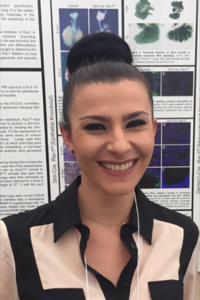Soula Danopoulos, PhD, has been named the first recipient of a postdoctoral fellowship from the Hastings Center for Pulmonary Research (HCPR) at the Keck School of Medicine of USC.
HCPR was established in 2014 with a gift from the Hastings Foundation and unites important basic and translational lung research with clinical care under a single umbrella at Keck Medicine of USC.

Soula Danopoulos
The HCPR fellowship will support Danopoulos’ research on lung development and identifying those factors in human lung development that differ from mice. Danopoulos has identified a double positive progenitor cell population that exists in humans, but does not exist in mice, and appears to have an important role in promoting adequate human lung branching morphogenesis.
As with other fields of medical research, mice are important models in pulmonary disease research and in testing new therapies. Understanding the ways in which humans and mice develop lungs differently should help other scientists better interpret the results of their research.
“Understanding the differences between humans and mice will increase translational power,” Danopoulos said. “Identification of differences and similarities between mouse and human lung development likely will improve the translational potential for mouse studies and ultimately develop novel therapeutic targets for human lung diseases.”
Danopoulos said she is grateful for the funding for her research and for the support of the community of lung researchers who are brought together by the Hastings Foundation.
“The Hastings Foundation helps people in this field interact with others through symposia and meetings at Keck Medicine, which helps foster collaborations,” Danopoulos said. “This is especially important for someone junior in my position.”
Zea Borok, MD, professor of medicine and Ralph Edgington Chair in Medicine at the Keck School, said that launching this fellowship program, which provides funding for up to two years, helps to fulfill one of HCPR’s core missions, which is to provide training and career development for young researchers in the field.
“Advanced lung disease affects millions of people, many with limited treatment options. Elucidating mechanisms underlying human lung development and how such developmental programs go awry is key to advancing therapies for patients with lung disease,” said Borok, who also is director of the HCPR. “We believe Dr. Danopoulos will shed light on an important developmental process, which will ultimately lead to research advances for many important pulmonary diseases.”
— Hope Hamashige

